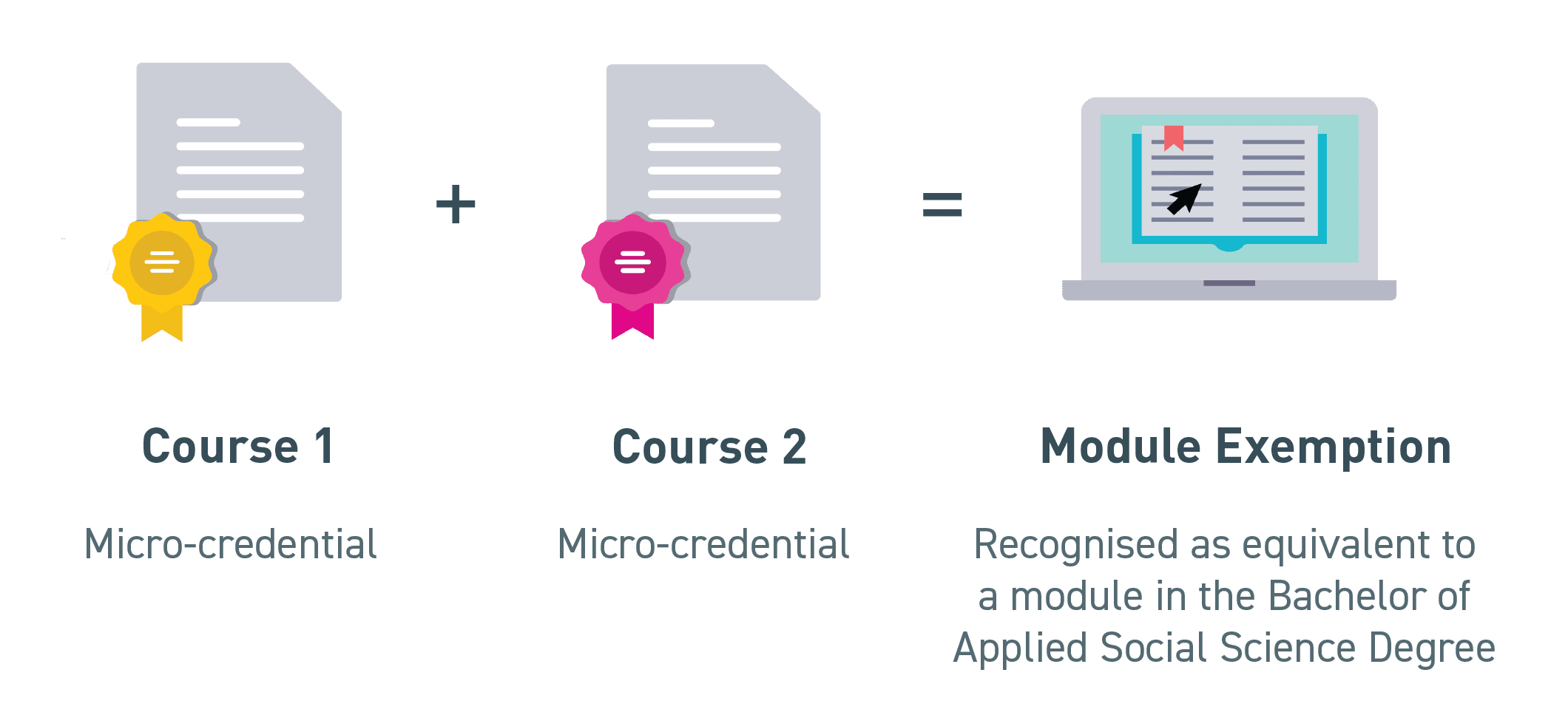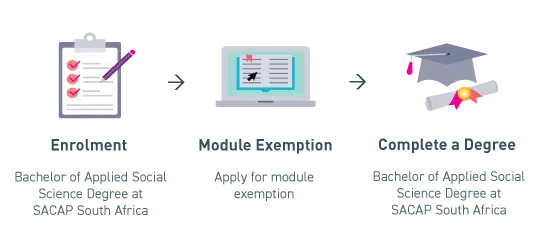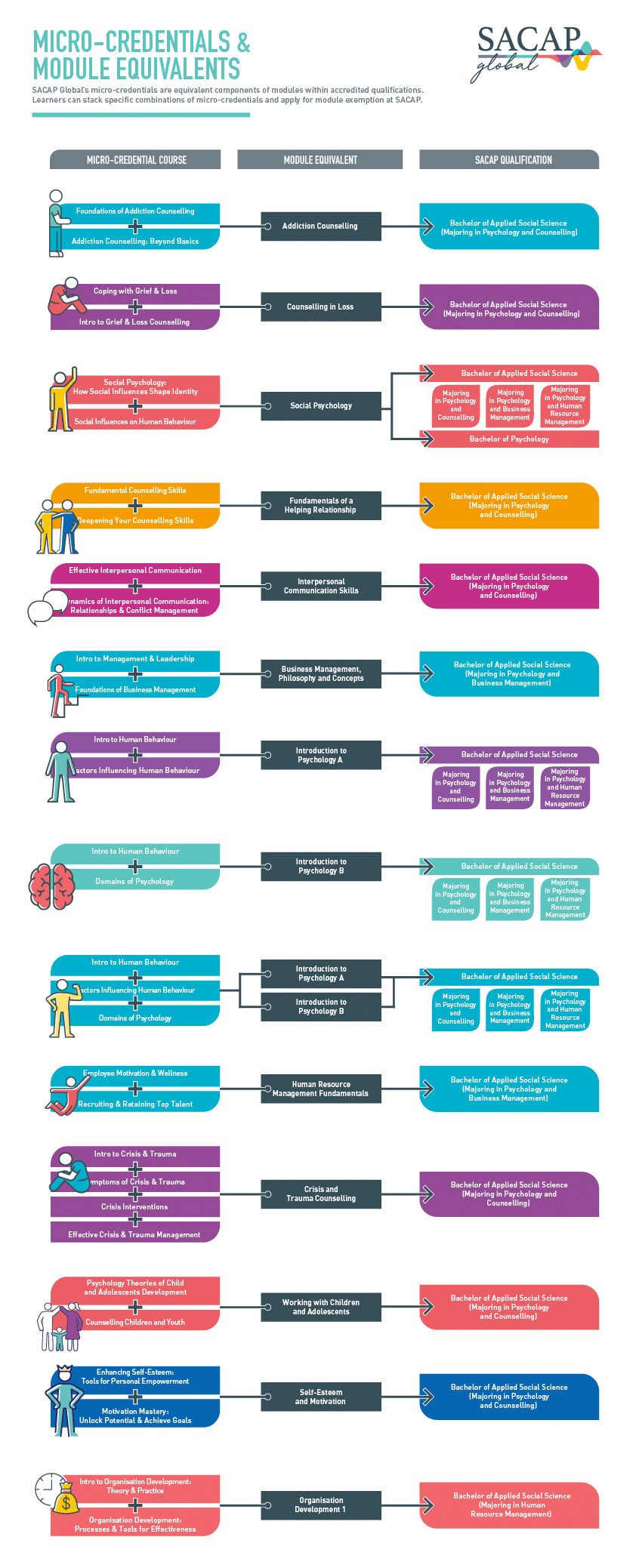Thanks to more agile and innovative curriculum and ed-tech developments, you can now sign up for stackable credentials. Thus, beginning your journey towards a degree at your own pace. At SACAP Global, you can successfully complete and combine micro-credentials to form the equivalent of specific degree modules.
These modules form part of broader undergraduate degree programmes, which offer various specialisations. This means that if you meet the minimum entrance requirements for the accredited degree programme, you can apply for module exemption for the specific modules you have already completed by means of the equivalent micro-credentials.
So what are some reasons for wanting to get module exemption? What exactly are stackable credentials? In this post, we first give a bit more background about shifting needs in the online learning environment. Thereafter, we’ll discuss these questions. We’ll also share some more details about the variety of stackable credentials available at SACAP Global.
Background: changing needs in the online learning industry
Global events over the last few years have forced us to learn and work in different ways online. However, even before the pandemic, higher education was already evolving with the rise of MOOCs and more flexible types of online learning.
So while we were already moving towards more agile forms of education, the past two years have concretised a shift towards non-traditional learning, including stackable credentials. Here are some of the reasons why people are choosing to study differently online with flexible short courses:
Online learning is becoming the norm
Online learning is the way forward as we adapt to a changing world. While we might have adapted due to circumstance, this model is preferable overall for many learners seeking formal qualifications, especially those who are already employed or have families.
Flexibility
Flexibility is almost becoming a non-negotiable when it comes to work and study. As the lines between work and home have blurred over the last two years, we’re all looking for ways to find a balance between our personal lives and advancing our careers.
Learning online provides a significant amount of flexibility, but what if you can’t afford to sign up for a four-year degree immediately, and need to work full or part-time?
Affordability
Not everyone can afford to register for a degree full-time, which makes signing up for shorter courses more feasible. With the bonus of being able to study, work and learn on the job, this approach seems to be the most cost-effective way to upskill.
Opportunities to explore
Apart from the benefits of flexibility and affordability, short courses also offer you the ability to try out different fields before committing to a full-time formal qualification.
MOOCs, for example, have provided learners with avenues to explore different fields, to gauge their interest. Micro-credentials also allow upskilling in new areas or complementary areas that weren’t covered in a person’s foundational studies.
According to a guest post on Inside Higher Ed called “Stackability is a Learning Strategy”, module exemption and stackable credentials are not only practical tools for learning in a changing world. They also form part of a lifelong learning strategy. According to the post, degrees themselves have not become less valuable, but the ways that people are attaining them are expanding.
Now you have a bit more background about the industry. Let’s move into the specifics of what it means to apply for module exemption with stackable credentials.
What are stackable credentials?
A stackable credential is a short course that is both stand-alone and can form part of a broader formal higher education qualification. How are they “stackable”? A specific combination of micro-credentials can be combined, or “stacked”, to satisfy the completion requirements for an equivalent degree module.
This means you do the same work as you would in a degree module, but instead, you’re doing all the necessary coursework in more manageable bitesize segments, as opposed to doing an entire module all at once.
What is module exemption?
When you successfully register for a qualification, you can apply for module exemption through a Recognition of Prior Learning (RPL) process. Module exemption is given when you can demonstrate you have achieved the same learning objectives of a degree module by completing previous studies e.g. a combination of shorter courses instead.
Practically speaking, you can apply for module exemption so that you don’t need to redo work you have already done. With SACAP Global, you can complete a set number of micro-credentials, which are then equivalent to a specific SACAP degree module.
How to apply for module exemption at SACAP
SACAP Global offers several stackable credentials, which you can complete and then use to apply for specific module exemption when applying to these programmes:
- Bachelor of Applied Social Science majoring in Psychology and Counselling
- Bachelor of Applied Social Science majoring in Psychology and Human Resource Management
- Bachelor of Applied Social Science majoring in Psychology and Business Management
- Bachelor of Psychology
As we’ve mentioned already, it’s important to note that you will need to meet the requirements for admission into the degree programme to be eligible to apply for module exemption through the RPL application process, no matter what majors you choose.
What are the specific combinations of micro-credentials?
We’ve talked about module exemption and stackable credentials, but what exactly does this look like when enrolling for a course at SACAP Global?
Here is a visual that illustrates how micro-credentials can be stacked towards a formal degree.


Register for our range of micro-credentials at SACAP Global
We’ve covered a lot of ground in this post, and given you some background as to why you might choose to complete shorter courses and start your journey in working towards a degree in your own time. This is because as the world evolves, and learners’ needs are changing, the education industry is becoming more agile. At the same time, you are upskilling in the areas you are learning about.

As you can see from the graphics above, there are a variety of different micro-credentials that you can complete at SACAP Global. Whether you choose to focus on Counselling, Human Resource Management or Business Management, these flexible short courses can count towards a formal qualification, namely the Bachelor of Applied Social Science degree.
This post has given some introduction to the process of applying for module exemption and would have clarified what stackable credentials are. However, if you have any other questions, please visit our FAQ page. You are also welcome to contact us for any further information.
